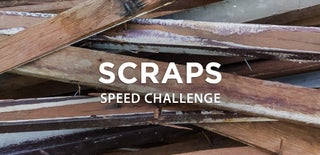Introduction: Spinning Light Bulb
This Instructable shows you how to make a spinning light bulb.
You can see my machine working in the video.
The wheel is from an old trolley. It is spinning on top of an old spiral connector from a recycled vacuum cleaner.
In the video, you can see how I used to drill to rotate the wheel but you can use a motor with a toy car wheel.
Supplies
Components: 1.5 V/6 V/12 V light bulb or LED/bright-LED, power source (1.5 V battery or 2 AA/AAA to make a total of 3 V minimum voltage that is needed for the LED), 1 mm metal wire, screws, high power/thick 2 mm metal wire (insulated or non-insulated), piece of cardboard (for the stand), masking tape/electrical tape, blue tack or plasticine.
Tools: scissors, pliers, drill (electric or manual).
Optional components: LED resistor, pen springs.
Optional tools: wire stripper, soldering iron.
Step 1: Connect the Light Bulb
If you are using a bright LED then you need to calculate the resistor value that you will need to connect in series with the bright LED:
Rs = (Vs - Vled) / Iled
Vs = 3 V: Rs = (3 V - 2 V) / 10 mA = 100 ohms
Vs = 4.5 V: Rs = (4.5 V - 2 V) / 10 mA = 250 ohms or 270 ohms
Vs = 6 V: Rs = (6 V - 2 V) / 10 mA = 400 ohms or 390 ohms
Vs = 9 V: Rs = (9 V - 2 V) / 10 mA = 700 ohms or 680 ohms
Vs = 12 V: Rs = (12 V - 2 V) / 10 mA = 1,000 ohms or 1 kohms
Step 2: Make the Wheel
You need wires at the bottom of the wheel to touch with the spiral connector.
Initially, I tried connecting one wire through the big main hole at the wheel centre and another wire on the edge of the wheel. This method did not work well at all. Thus I decided to drill two holes. However, you can try the first design/method if you do not have a drill.
I also inserted two screws to make the wheel stand straight on top of the spiral and thus improve the electrical contacts. I used force to push the screws in. I did not drill holes for the two screws and yet the wheel did not crack because it is mostly rubber and not plastic.
You can try using pen springs to improve conductivity.
Step 3: Attach the Spiral
Use masking tape to attach the spiral to the piece of cardboard.
The wire does not have to be insulated.
Step 4: Attach Axis
Cut another piece of insulated metal wire and attach the axis.
The wire does not have to be insulated.
Step 5: Connect 1.5 V Battery
12 V light bulb will need eight 1.5 V batteries connected in series, one 12 V car battery, or fully charged 9 V battery. 6 V light bulb will need four 1.5 V batteries connected in series. A LED will need at least two 1.5 V batteries or 9 V battery. 1.5 V batteries could be AA, AAA, C or D type.
Step 6: Attach the Wheel
I placed the wheel thought the axis and the light bulb turned ON.
Step 7: Testing
You can see my machine working without a blue tack.
The connections from the wheel to spiral are not perfect and this is why light bulb is not ON all the time.

Participated in the
Scraps Speed Challenge











